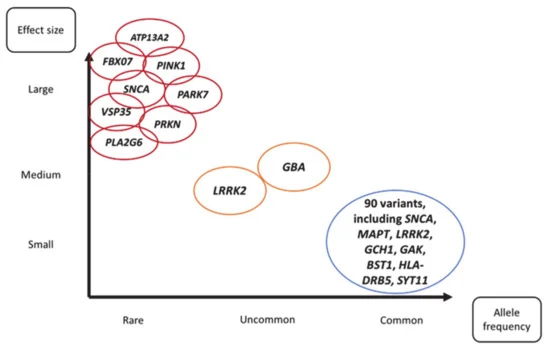If you have parents or grandparents who have been diagnosed with Parkinson’s disease, or if you yourself have the disease, you have likely wondered: Is Parkinson’s disease hereditary? Is Parkinson’s disease genetically transmitted from parent to offspring?
While just over two decades ago, Parkinson’s disease was believed to have no genetic links, researchers have now attributed approximately 10-15% of Parkinson’s cases to genetic causes.
In this article, we will discuss genes linked to Parkinson’s disease and answer common questions about Parkinson’s disease genetics.
Similar to many other neurodegenerative diseases, experts currently believe Parkinson’s disease is multifactorial, meaning it is not caused by a single factor but rather develops from some combination of several factors. In the case of Parkinson’s disease, these factors are primarily genetic and environmental.
While relatively rare, Parkinson’s disease can run in families as a result of genetic variants on specific genes being inherited or passed from parents to their children. These genetic variants contribute to Parkinson’s disease risk, onset, and progression. There are also a few ethnic groups, such as the North African Arab Berbers and Ashkenazi Jews, that more frequently carry mutations on genes linked to Parkinson’s disease, though researchers have not yet figured out why.
Over the past several decades, researchers have discovered quite a few variants in genes that may contribute to Parkinson’s disease. Genes associated with Parkinson’s disease include but are not limited to:
| Gene | Mutation | Year of Discovery | Inheritance Pattern | Frequency |
|---|---|---|---|---|
| SNCA | Missense or multiplication | 1997 | Dominant | Very rare |
| PRKN | Missense or loss of function | 1998 | Recessive | Rare |
| PARK7 | Missense | 2003 | Recessive | Very rare |
| LRRK2 | Missense | 2004 | Dominant | Common |
| PINK1 | Missense or loss of function | 2004 | Recessive | Rare |
| GBA | Missense or loss of function | 2009 | Dominant (incomplete penetrance) | Common |
Q: If I have a genetic mutation linked to Parkinson’s disease, will I eventually develop Parkinson’s disease?
A: Having a genetic mutation that has been linked to Parkinson’s disease does not guarantee you will develop the disease. Some mutations are associated with a greater risk of developing Parkinson’s disease than others, however, there is currently no single mutation that carries a 100% chance of developing Parkinson’s.

Q: If only 10-15% of Parkinson’s disease cases are caused by genetics, what causes the other 85-90% of cases?
A: While Parkinson’s disease can be hereditary and carrying mutations on specific genes associated with Parkinson’s disease can increase your risk of developing the disease, there are a range of other environmental and lifestyle factors at play. Risk factors for Parkinson’s disease include advancing age, male sex, and toxin exposure. Risk factors for Parkinson’s disease-related dementia include less education, hearing loss, traumatic brain injury, hypertension, alcohol consumption (>21 units/week), obesity, smoking, depression, social isolation, physical inactivity, diabetes, and air pollution.
Q: Are there genetic tests for Parkinson’s disease genes?
A: Yes, there are genetic tests available for several clinically-relevant Parkinson’s disease genes. However, many of the at-home genetic tests test for only a few genetic variants linked to Parkinson’s disease and, consequently, may be misleading for patients. Genetic tests do not take the place of a formal PD diagnosis and should always be done with the guidance of a genetic counselor. The Parkinson’s Foundation PD GENEration study performs in-person and at-home genetic testing for seven Parkinson’s disease-related genes (GBA, LRRK2, PRKN, PINK1, and VPS35) and genetic counseling at no cost for people with Parkinson’s disease.
While Parkinson’s disease can be hereditary, the majority of cases are not. Even if someone tests positive for a Parkinson’s disease-related genetic variant, it does not necessarily mean they will go on to develop Parkinson’s disease but rather are at an increased risk of developing Parkinson’s disease.
Altoida’s mission is to accelerate and improve drug development, neurological disease research, and patient care. To learn more about our precision-neurology platform and app-based medical device, contact us!